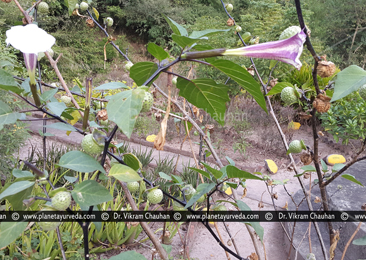Dhattura (Datura metel)

Description of Plant
Dhattura (Datura metel) is large, erect and stout an annual herb that grows up to 3 ft. high is known by the Thorn apple plant. It somewhat furry, having dark violet shoots with oval to broad oval leaves which are often dark violet as well.
Leaves are simple, oval to broad oval in shape that are often dark violet in color and are alternate in arrangement.
Flowers of this plant are large, greenish white or it can be yellow, red, and violet in color which are pleasantly-scented and are bisexual, and hypogenous. Its seed capsule is covered with many tapering humps and a few spines.
Roots are cylindrical in shape having lateral branches. It is brown in color and have rough surface because of presence of Fissures.
The stem of this plant is green hollow and herbaceous with strong odor.
Fruits are knobby and not spiny. Capsule is ovate to obovate with persistent reflexed calyx; about 4 cm long, 3 cm wide, covered with short, stout, spines; taste, bitter and acrid. Inflorescence are Solitary and axillary cyme.
General Description
Dhattura also known by the name thorn apple is a poisonous herb but is used in many Ayurvedic medicines after purification method. Leaves of Dhattura plant have medicinal properties like antitumor, anti-rheumatic and anti-inflammatory and its flowers are anti-asthmatic. The leaves, seeds and root are anti- catarrhal, febrifuge, anti-diarrhoeal, anti-dermatosis in nature.
Its chemical composition Scopalamine, Daturadiol, Hyoscyamine, Fastudine, Allantoin, Niacin, Vitamin C, Atropine, Noratropine, Meteolodine, hyosine, Fastusic acid etc.
Classification
- Botanical Name: Datura metel
- Kingdom: Plantae
- Division: Magnoliophyta
- Class: Magnoliopsida
- Order: Solanales
- Family: Salanaceae
- Genus: Datura
- Species: Metel
Habitat
Datura metel is commonly found in tropical parts of India to temperate parts of Himalayas. Also found all over Bangladesh in road sides and other fallow lands. It is invasive in parts of Kenya, Tanzania and Uganda.
Its growth is very good in a fertile calcareous soil.
Names
- Sanskrit Name – Dhuttura Kanaka, Kanakahvya
- Hindi Name – Sada Dhattura
- English Name – Thorn apple, Devil’s trumpet, Metel
- Telugu Name – Ummetta
- Tamil Name – Ummattangani/Vella-Ummathai
- Bengal Name – Dhattura
- Gujarati, Marathi Name – Dhattura
- Urdu Name – Dhattura
- Kannada Malayalam Name – Unmatta, Dhattura
- Arabian Name – Datur
- Farsi Name – Tatur
Ayurvedic Properties
| Hindi / Sanskrit | English | ||
| Rasa | Laghu, Rooksha | Taste | Light, Dry |
| Guna | Tikta, Katu | Physical Property | Bitter, Pungent |
| Virya | Ushna | Potency | Hot |
| Vipaka | Katu | Metabolic Property (After Digestion) | Pungent |
Effects on Doshas
It is useful to balance Kapha and Vata Dosha.
Classical Categorization
| Upavisha Varga |
|
Category of Herbs with toxic effects on the Body |
Ancient Verse about Datura metel

The Bhavprakash nighantu edition of 1998: verse – 85-87, page no. – 317-320.
The names of Dhattura are Dhattura, Dhurta, Unmatha, Kanakahvya (golden yellow colored seeds), Devata, kitar, Turi, Mahamohi, Shivapriya, Matula and Madana all its Sanskrit name. It is sedative. It aagravates Vata. Promotes digestive fire. Astringent, sweet and bitter in taste. It manages Lice and Ticks, itching. It is hot in Potency. It is antimicrobial and anti-toxin in action.
References
The Bhavprakash nighantu with elaborated Hindi commentary by Padmashri prof. K.C. Chunekar, edited by Dr. G.S. Pandey: edition of 1998: verse- 85-87, page no-317-320.
Practical Uses of Datura metel
Dhattura is a source of narcotic, acrid, anodyne, antispasmodic, intoxicating, and emetic, sedative, Hypnotic properties.
- It is useful herb as a CNS stimulant.
- It is also found to act in motion sickness, nauseas, and dizziness.
- It is also a significant part of preoperative indication.
- It is useful herb in case of need in uterine stimulation.
- It is helpful in alleviating aches and good in arthritis problem.
- It can induce Vomiting.
- It can reduces headache.
- This herb is useful in ophthalmic case for dilating the pupil of eye.
- It even provides relief by reducing the swelling and pain.
- Its external application helps in rapid healing of wound
- It is also a good and useful herb in relieving fever.
- When applied as paste it detoxifies skin and provides relief from itching
- Oral administration of purified Datura seed is suggested in chronic respiratory disorders, asthma and dysuria.
- Dhattura is useful herb in Anxiety Disorders.
- It benefits as it has ability to reduce Spasm
- It can cause small increase in Blood Pressure.
- In some places like Java seeds are put in into cavities or chewed to get relief from dental pain
Part Used
- Seeds
- Flower
- Root bark
- Leaves
Dosage
Seed – (After purifications) 50 – 100 mg
Cautions
- Dhattura is tremendously a poisonous plant.
- It is not advised for pregnant, lactating mothers and children.
- Toxic effect of Dhattura on body are like:
- Dryness of mouth, extreme thirst,
- Increase in heart rate.
- Blurring of vision with prominent mydriasis,
- Hallucinations, delirium, and loss of motor coordination which may further lead to coma and ultimately to death by respiratory failure.
- It is not recommended for pregnant, lactating mothers and children.



